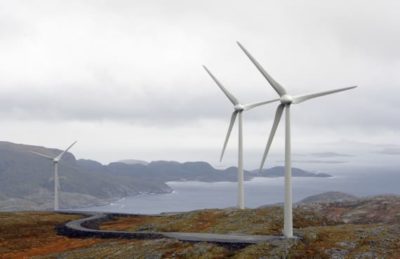Prime Minister Erna Solberg’s conservative coalition is scrapping a new national wind energy plan that identified specific areas as best-suited for windmills. It proved to be highly controversial, prompting Solberg to back down after massive criticism that huge wind turbines can ruin scenic wilderness and that local objections could be overruled.

“This was supposed to be a measure that would ease conflicts,” Solberg told state broadcaster NRK, referring to the “national framework” for land-based wind energy proposed by the state energy directorate (NVE) last spring. “It hasn’t been, given the response we’ve received.”
The national wind energy proposal has been out for a public hearing period that ended on October 1. Solberg has now given in to overwhelmingly negative reaction from 56 municipalities that would have been most affected by windmill projects. NRK reported that fully 49 rejected the prospect of large wind turbines in their area, while three were skeptical.
“We therefore think we’ll set aside the proposal, and say that we won’t have any national framework for wind energy,” Solberg told NRK.
Major dilemmas
The proposal presented both an updated status of the effects of wind energy and a map depicting 13 regions around Norway deemed most suitable for windmill projects. The maps especially set off a storm of controversy from those living in the affected areas, which included nearly all counties except Oslo, Akershus, Oppland and Troms.
Coastal areas accustomed to strong winds gusting in from the sea were viewed as especially well-suited for wind turbines. Protests have been loudest in Trøndelag, where wind energy projects already have set off demonstrations and civil disobedience.
Wind energy poses huge dilemmas not only for Solberg’s government but also among climate and environment advocates otherwise keen on developing renewable energy as an alternative to oil and gas. While some organizations firmly support wind energy and contend that some scenic landscapes and wilderness must be sacrificed, others object and only want wind energy projects contructed offshore.
Energy debate continues
Norway already has a long history of tapping into renewable energy sources, not least through the generation of hydro-electric power from its waterfalls and rivers. Many of those projects have stirred massive protests as well, when waterfalls disappear into pipes and wild rivers are tamed.
Governments, not just Solberg’s, have been caught in the middle of debate and it can be frustrating for her and other leaders. On the one hand, she’s under constant pressure to cut carbon emissions and criticized for not reining in the oil and gas industry, only to meet resistance to wind energy projects as well.
“This was never a plan to actually develop wind power, rather to map out where it was best to have wind power if applications came in to develop it,” Solberg said. “That’s what we’re now setting aside.”
Emphasis on ‘listening,’ and licensing to be tightened
Asked whether she should have anticipated all the strong oppositon to NVE’s proposal, she claimed her government rather wanted to ask the “explicit question” of whether there should be a national framework for wind energy. “Now we have the answer that no, there shouldn’t be,” Solberg told NRK. “This was a real hearing on a question where we asked for folks’ feedback and we have listened to it.” Her government has recently been under attack for not listening to “folks’ feedback” on a wide variety of other issues, from forced county and municipal mergers to police and hospital reforms.
Solberg also said that the rules for granting licenses for wind energy projects will be tightened. All applications for permission to build windmills that have been awaiting approval will remain on hold until changes in the process are clarified, said Solberg’s Oil & Energy Minister, Kjell-Børge Freiberg.
“When we invite feedback, we do intend to listen,” Freiberg insisted, even though his ministry has turned a deaf ear to most all calls to rein in oil and gas exploration and production. “We see a need to do something with the licensing system to make a good system even better,” Freiberg said, “and ward off the kind of conflicts we’ve seen around individual wind energy projects.”
Freiberg signalled an overhaul of deadlines, when local governments must be involved, and disclosure of details for projects seeking licenses through his ministry.
newsinenglish.no/Nina Berglund

